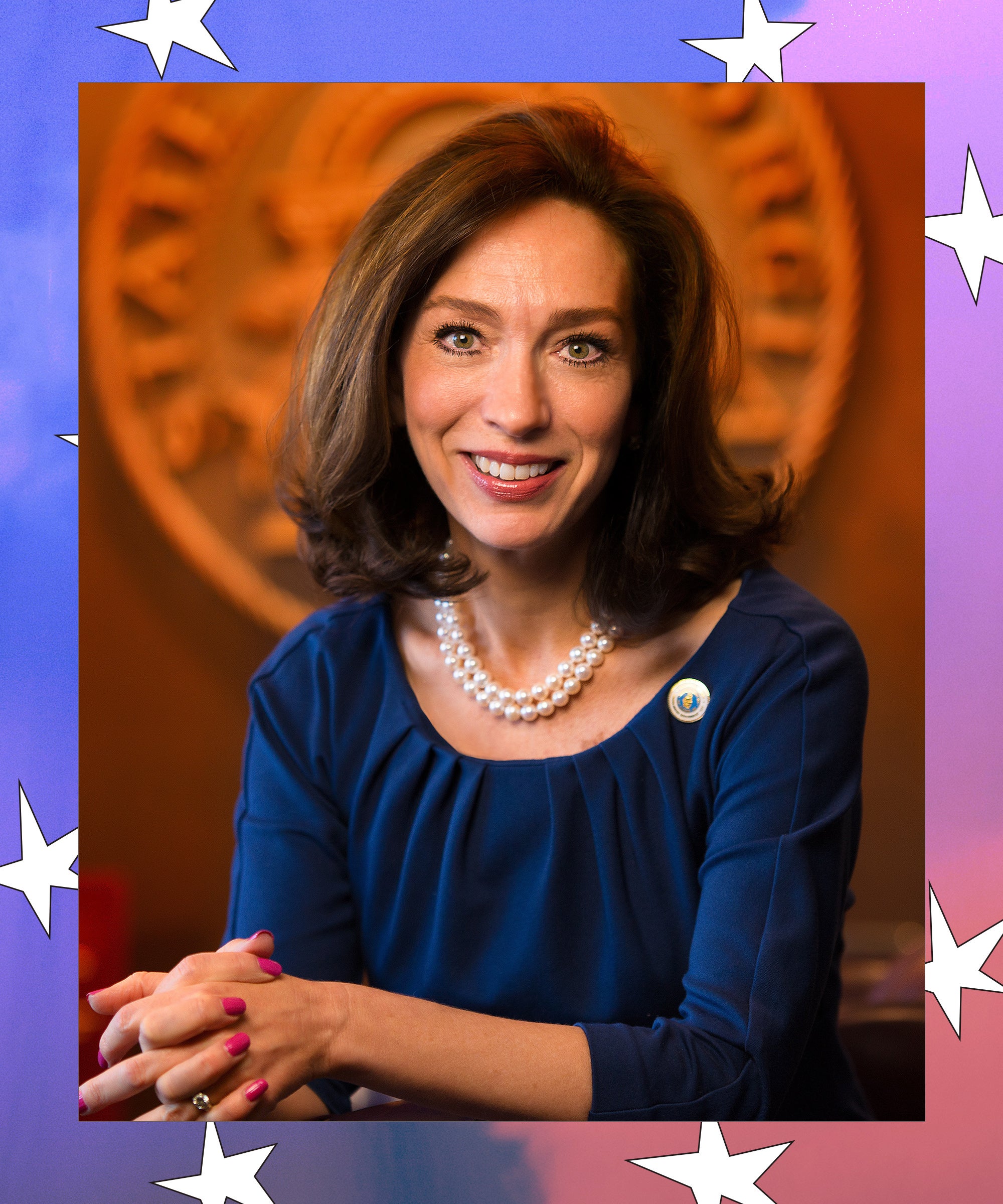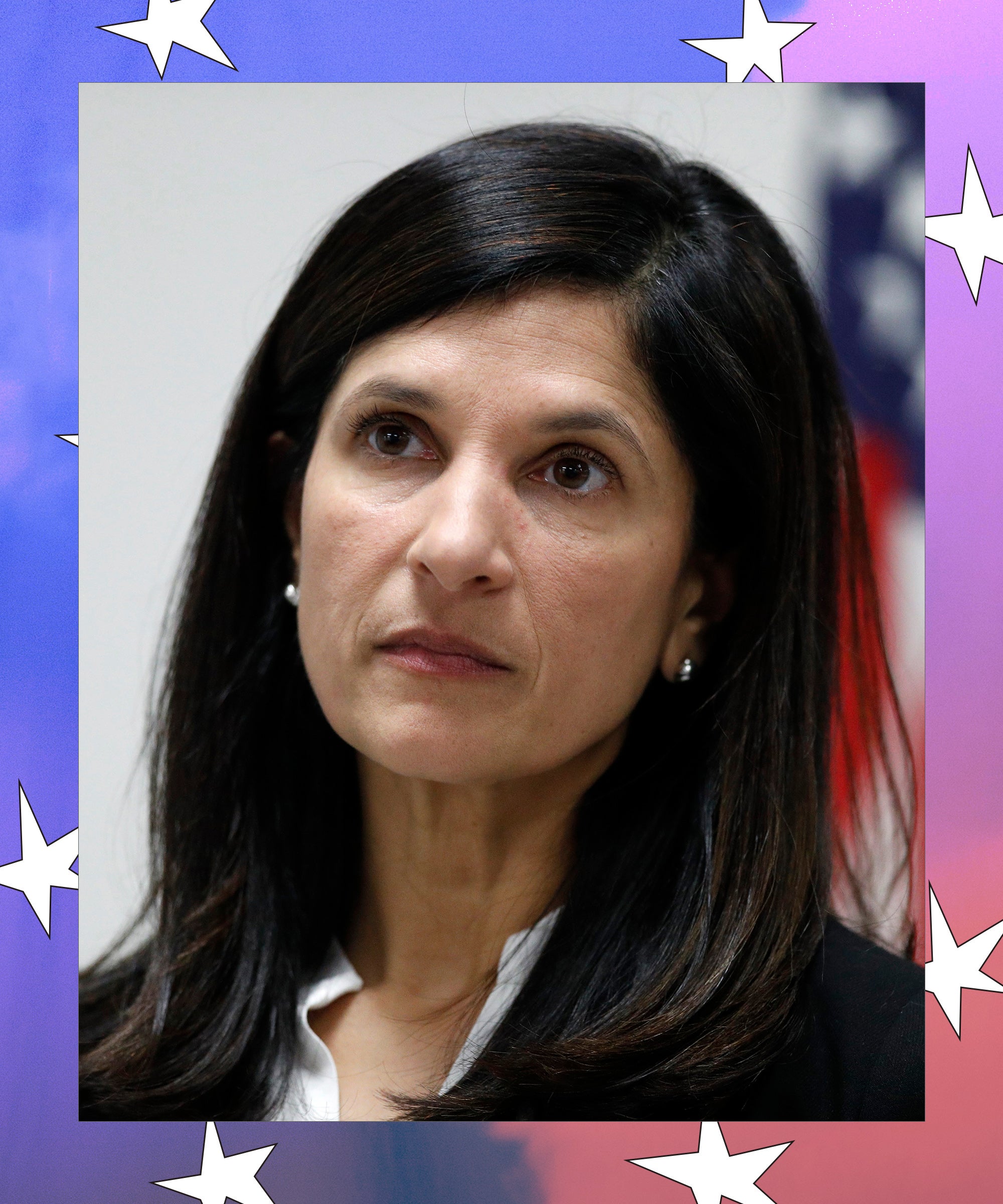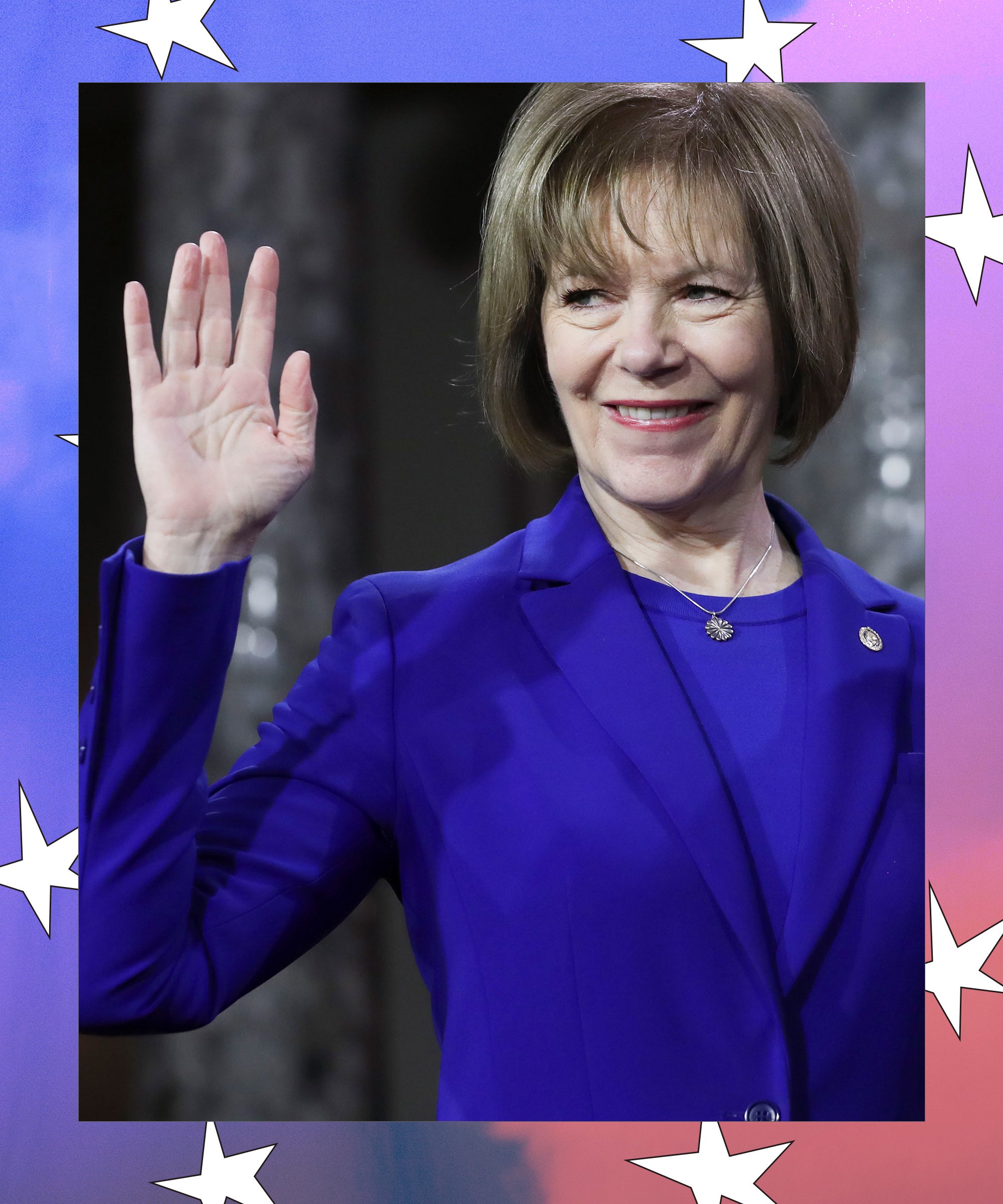Flipping The Senate Is Crucial This Fall. These 8 Women Can Make It Happen.
April 03, 2020DMT Beauty#DMTBeautySpot #beauty
Getting rid of Donald Trump in order to get the country back on its feet is undoubtedly Democrats' key goal in the 2020 elections. Retaking the presidency would, no doubt, be a major victory, but in order for Democrats to enact the game-changing policies they have promised, winning back the Senate is equally crucial.
The Senate’s dysfunction has become increasingly apparent since 2018 when Democrats took control of the House of Representatives. Since then the House has been prolific in passing bills on everything from LGBTQ+ rights to universal background checks, only to have that legislation die in the Republican-controlled Senate. Senate Republicans openly acknowledge that their lack of action is rooted in partisanship. As Senate Majority Leader Mitch McConnell told Fox News, "It's not that we're not doing anything. It's that we're not doing what the House Democrats and these candidates for president on the Democratic ticket want to do."
By winning the Senate, Democrats can unclog the backup of unpassed laws, decide the fate of the president’s agenda, and determine which judges get on the Supreme Court. But the path to victory is not going to be easy. Unlike the House, not every seat in the Senate is up for reelection each year, making it harder for Democrats to win control. In 2020, however, Republicans are particularly vulnerable, with 23 of their Senate seats up for reelection compared to just 12 for Democrats. To win, Democrats need to not just defend their seats but gain at least three if they win the White House and four if they don’t. Fortunately for Democrats, Inside Elections rated only 10 of the seats up for reelection “Solidly Republican,” indicating significant vulnerabilities for Democrats to mine.
Especially as the presidential race has narrowed to a contest between older, white men, Senate races offer an exciting opportunity for new voices to emerge. In this latest cycle, an impressive group of women candidates have taken up the mantle of flipping the Senate, facing off against Republicans in historically red or competitive states. For anyone still mourning Elizabeth Warren’s campaign, these women offer a glimpse into the bright future for women in politics. "The formidable women candidates in the 2020 Democratic presidential primary were Senators," Erin Vilardi, founder of the nonprofit VoteRunLead, told Refinery29. "More women Senators may well translate to more national female leadership and future Presidential candidates."
The success of women candidates in these elections is essential both for protecting women's rights, but also for adding much needed diversity to the Senate. Only 56 women have ever served in the Senate, and currently women make up only a quarter of the Senate, despite being over half the US population. “In 2020, we have the opportunity to set another record for women's representation in our government,” added Vilardi. “That's something to be excited about.”
Ahead, we profiled eight candidates — some long shots, some not-so-much — who could help turn the Senate blue this fall.

Amy McGrath, Kentucky
At 13, Amy McGrath’s dream was to become a fighter pilot, but she was told women weren’t allowed. In a letter to her Senator, McGrath asked him to change the law and never heard back. That senator was Mitch McConnell, and now McGrath is running to take his Senate seat.
From the start, McGrath’s campaign gained serious national attention. Just 24 hours after launching her campaign, she received $2.5 million in donations and as of January raised almost $17 million. The fervor around the Kentucky Senate race is partly due to McConnell’s status. As Senate Majority Leader, McConnell refuses to work with Democrats, calling himself the Senate’s “grim reaper.” This blatant partisanship has informed his political decisions like his refusal to confirm Obama-appointee Merrick Garland to the Supreme Court and his effort to block witnesses in Trump’s impeachment trial. McGrath rebuked McConnell’s prioritization of country over party, emphasizing that while McConnell was fortifying conservatism in Washington, he ignored his constituents. “Did he work to lower prescription drug prices and pass the bipartisan measure that would allow Medicare to negotiate drug prices? No. Did he work on pushing through much needed investment in our infrastructure? No,” McGrath told Refinery29.
McGrath promises to be the corrective for McConnell’s partisanship. “We are focusing on the bread-and-butter issues that McConnell has ignored for 35 years — healthcare, jobs, education, and 21st-century infrastructure,” she said. But her case for being the next Senator from Kentucky runs deeper than just policy. McGrath served 20 years in the Marines and said that experience was a practical exercise in putting country over party. These years of service also sharpened McGrath’s moral compass, a common trait among many veterans, which she believes makes them uniquely qualified for political life. “We badly need more veterans in office who have real-life experience in the 21st-century globalized world.” She added, “veterans take values like character, integrity, and honor seriously — and there is a serious lack of those values in our political leadership right now.”
McGrath is the clear favorite in her June 23 primary, but the general election may prove tricky given Kentucky’s history as a Republican state. Trump won the state by 30 points in 2016, and McConnell has held his Senate seat since 1984. But despite his power, McConnell is a deeply unpopular Senator with a 50% disapproval rating. In 2019, Democrat Andy Beshear defeated Republican incumbent Matt Bevin in the governor’s race, giving Kentucky Democrats a boost. While political analysts might see Beshear’s victory in terms of numbers and demographics, McGrath attributes the win to a deeper sea change. “Gov. Andy Beshear defeated Matt Bevin, because, like McConnell, Bevin was self-serving and worked to divide us, not bring us together.” Like Beshear, McGrath seeks to evoke a sense of unity. “This campaign is about bringing everyone together, Kentuckians of all demographics and political stripes, so we have the means to move our commonwealth and nation forward at a time when we cannot afford to be left behind.” 
MJ Hegar, Texas
Before launching her campaign for Senate, MJ Hegar entered the political world in 2018 when she came just shy of defeating Texas Rep. John Carter. Despite her loss, Hegar gained national attention with her viral ad “Doors”, chronicling the literal and symbolic doors that set Hegar on the path to running for office. These included the door Hegar’s abusive dad pushed her mom through while Hegar was a child; the door to join the Air Force which sent Hegar on three tours of Afghanistan and earned her a Purple Heart for continuing to return fire on the Taliban after her helicopter was hit; and finally the door of the Pentagon, which, in 2012, Hegar sued along with the ACLU over the ban on women serving in direct ground combat roles.
The lawsuit in particular marked a turning point in Hegar’s drive to champion justice. “Fighting for equality, and not just women’s rights but for a stronger military, made me redouble my motivation to fight for workers’ rights and our right to organize,” Hegar told Refinery29. The lawsuit proved successful, and then-Defense Secretary Leon Panetta reversed the ban. However, Hegar says when she heard Jeff Sessions threaten to legislate the ban back in place, she faced the rude awakening that little can be achieved in Washington without money or connections. “It infuriated me. Because I took an oath to the constitution, and I bled for that oath,” Hegar said. “Doors” illustrates this frustration, showing Hegar knocking on countless office doors only to be turned away. One of those doors belonged to her representative and future political opponent — John Carter.
Hegar lost the race against Carter by three points, but the results only further cemented her confidence. “The congressional district was much redder than the rest of the state because of gerrymandering,” Hegar explained. If you used the district as a focus group and applied the right algorithms, she argues, the numbers indicate she would be able to win a statewide race. Hegar compares her decision to run for Senate to an ethos she learned as a wildfire suppression pilot: put out the biggest fires first. After watching the Brett Kavanaugh hearings and seeing the backlog of legislation Republicans refused to vote on, Hegar emphasized “the fire was very clearly in the Senate.”
Hegar has already passed the first hurdle of her Senate race, coming first in March’s Democratic primary with 22.3% of the vote and advancing to a runoff election on May 26 alongside Democrat Royce West. The winner faces incumbent Sen. John Cornyn, a staunch Republican who called Trump’s impeachment a “sham”. Cornyn’s support of Trump hasn’t translated to high approval back home. In February, The Texas Observerreported only 56% of Republicans plan to support Cornyn in November. “John Cornyn is vulnerable,” Hegar explained. “We don’t only have to find good Democrats to run against incumbents, we have to find the right Democrats.” Between her history of service and broad appeal, Hegar says, she’s just the one for that job. 
Paulette Jordan, Idaho
Paulette Jordan is no stranger to making history. In 2018, she became the first Democratic woman nominated for governor in Idaho. Jordan faced an uphill battle, losing to Republican Brad Little in the general election. Had she won, Jordan would have been the nation’s first Native American governor and Idaho's first female governor.
Now, Jordan is running for Jim Risch’s Senate seat, another difficult task. Idaho is a very white, conservative state with Republicans controlling every level of government. Risch votes with Trump over 90% of the time and maintains approval ratings in the mid-forties. Nevertheless, Jordan’s faith is unshakeable. “I’m running because I know I can win,” Jordan told HuffPost, ahead of the May 19 primary. “Idaho is ready for new leadership.”
The demographics may not appear to work in Jordan’s favor, but Jordan has experience finding common ground between people with opposing views. As “lake ambassador,” Jordan coordinated the clean-up of pollutants from silver mining in various parts of Idaho including Jordan’s Coeur d’Alene Reservation. Some towns Jordan visited on the job were so hostile to Native Americans that her tribe suggested she hire security. Jordan decided against it in order to build a relationship with the townspeople, telling BuzzFeed News, “I knew I needed to go talk to them directly.”
During the two terms Jordan served as an Idaho state representative, she impressively won reelection in 2016, an otherwise bleak year for Idaho Democrats. Resigning to run for governor in 2018, Jordan emphasized that Idaho’s leadership is “stuck in the 1950s,” and remains proud of her progressive gubernatorial platform, encompassing Medicaid expansion, support for undocumented immigrants, and increasing educational resources for Idaho’s Latinx community.
Fellow politicians have been quick to dismiss Jordan. Her Democratic gubernatorial primary opponent, A.J. Balukoff said she lacked experience, noting “she may be what we need next time.” Jordan beat Balukoff handily in the primary, and his statement is simply untrue. On top of serving in the state legislature, Jordan became the youngest member of the Coeur d’Alene Tribal Council in 2009 and descends from a line of chiefs and tribal leaders, including her grandmothers who taught her that leadership is about compassion and listening. Speaking to BuzzFeed about her former opponent's dismissal she said, “We’ve seen this attitude all across the country, especially with female candidates.” She added, “But my grandmothers were always at the forefront. They’d say, we make the difference we want to see.”
Teresa Tomlinson, Georgia
The world of politics is nothing new to former Columbus, GA, Mayor Teresa Tomlinson. Growing up, the Georgia U.S. Senate candidate was introduced to politics through her friend’s father, state legislator Max Davis. What stuck with Tomlinson wasn’t Davis’ political ideology but the care he showed his constituents. “He was devoted to that public service of making government work for the people he represented and that left a lasting impression on me,” Tomlinson told Refinery29. “I have a really deep belief that government is meant to work for the people.”
Before Tomlinson can take on the incumbent, former CEO and Trump-loyalist David Perdue, she must defeat six other challengers in the May 19 primary, including former congressional candidate Jon Ossoff. In this crowded primary, Tomlinson hopes her hands-on approach and years of experience will set her apart. Out of all other Democrats running, Tomlinson observed, “I’m the only candidate who has ever won an election, the only one who has ever governed.”
Tomlinson counts criminal justice reform and healthcare as two key successes during her two terms as mayor, spanning 2011 to 2019. With regards to criminal justice, Tomlinson supported programs helping incarcerated individuals reintegrate into society and increased access to public defenders. On the healthcare front, she established a health and wellness clinic, improving the quality of healthcare for Columbus’ citizens and saving taxpayers $3 million yearly. For Tomlinson, political accomplishment is an important quality because voters “are hungry for government that actually works.”
Tomlinson identifies as a "pragmatic progressive." Pragmatism and progressivism are regularly seen as oppositional, but Tomlinson understands them as distinct yet essential components of governing. “Progressivism is a philosophy. It’s a philosophy that believes that mankind gets up everyday and takes a step forward and that the government needs to have a structure that moves forward with its citizenry,” Tomlinson explained. “Pragmatism is how you implement those policies.”
Tomlinson’s healthcare views are a product of this pragmatic progressivism. She believes everyone should be covered but thinks that goal is best achieved through modest changes. Tomlinson advocates for upholding and strengthening the Affordable Care Act, lowering the age for Medicare eligibility to 55, and offering a Medicare public option. “When you are talking about a progressive policy, you’re talking about envisioning the future,” she said. Enacting progressive policies in moderate ways can reassure voters who fear upheaval, she notes, adding “that can be scary for a lot of folks when you’re talking about a radical implementation process.”
In the coming election cycle, eyes will be locked on Georgia. Since Stacey Abrams’ near victory in the governor’s race and Lucy McBath’s triumphant campaign for Congress in 2018, Georgia is now considered a competitive state. With such high stakes, Tomlinson is confident Democrats will prevail. “Because I have a mastery of Democratic principles, I understand that they are the more effective governing principles.” She elaborated, “That tends to get me the eyes and ears of people who are more moderate, sensible, reasonable, and those who just want good government.”
Barbara Bollier, Kansas
When it comes to bucking partisanship, Kansas U.S. Senate candidate Barbara Bollier has walked the walk. Bollier, a Kansas State Senator since 2017, identified as a moderate Republican for many years. But in late 2018 Bollier switched to the Democratic party when she realized the Republican party had come to promote values she could not support like tax breaks for the wealthy. Bollier’s candidacy for Senate has been welcomed by Democrats like Sen. Chuck Schumer and former Kansas Gov. Kathleen Sebelius, both of whom have supported her campaign.
Speaking with Refinery29, Bollier emphasized that just because her party affiliation has changed, it doesn’t mean her views have. “For me the hard part was just changing gears from what I’ve always called myself, but my values haven’t changed and my votes haven’t changed.” Bollier notes that even as a Republican she was vocal about her disagreements with the party particularly with regards to former Gov. Sam Brownback’s tax policy and the lack of funding for public education. When asked if she feared any political fallout after the switch, Bollier responded, “I have never been in public office to satisfy political whims. I have been there to serve the people and that’s what I will always continue to do.”
Prior to entering the political arena, Bollier worked as an anesthesiologist, giving her particular insight on the issue of healthcare. “Both my experiences as a practicing physician as well as my experience in public service as a State Senator show me that we need reform,” Bollier said, naming cost and complexity as the two greatest threats to the system. “I know that we can bargain for our pharmaceuticals through Medicare and reduce cost,” she added. Bollier has already taken steps to enact this reform at the state level. Two years ago, she voted for a bill to expand Medicaid, though it was ultimately vetoed by then-Gov. Brownback. Just this February, Bollier introduced the End Surprise Medical Bills Act, which would prevent Kansans from being stuck with expensive medical bills after an emergency by allowing the insurer and hospital to negotiate a price.
The race for Pat Roberts’ Senate seat opened up early last year when the longtime Senator announced his plans to retire. For the August 4 primary, Bollier is on the ballot along with Manhattan Mayor Usha Reddi and two other Democrats On the Republican side, the frontrunner is former Kansas Secretary of State Kris Kobach who previously worked at the anti-immigrant lobbying group FAIR and was appointed vice-chair of Trump’s voter fraud commission. At first glance, flipping a Kansas Senate seat seems like an uphill battle since a Democrat has not won a Kansas Senate race since 1932. Yet Democrat Laura Kelly’s defeat of Kobach in the 2018 governor’s race proves that a Democratic victory in Kansas is possible. Polls from mid-February show Bollier holding her own, locked in a dead heat with Kobach. 
Theresa Greenfield, Iowa
Iowa U.S. Senate candidate Theresa Greenfield’s campaign is driven by “farm values.” Inspired by Greenfield's childhood on a farm, these values don’t just describe a hard work ethic, but represent a lifestyle that focuses on unity and generosity. “Farm kid values also mean pulling together to look out for one another in tough times,” she told Refinery 29. “In our small towns here in Iowa, if something needs to get done, you’re not going to see folks backing into partisan corners and pointing fingers.“
Farm values proved essential in shaping Greenfield’s political views. When Greenfield was 24 years old, her husband, an electric worker, died suddenly. With a 13-month-old baby and another on the way, Greenfield was able to pull through because of liberal policies driven by the same sense of community and helping others in need she found on the farm. “His Social Security survivor benefits, as well as hard-earned benefits from his union, and support from our friends and family made it possible for me to get back on my feet, go to school, and set out on a career path to support my boys,” Greenfield explained. Because of that foundational support, Greenfield went on to have a successful career and currently serves as president of a commercial real estate company. Knowing how government benefits translate to longtime successes, Greenfield asserted, “I will always work to protect and strengthen these critical earned benefits that so many Iowans turn to in times of need or after a lifetime of hard work.”
Greenfield’s incumbent opponent, Sen. Joni Ernst, has a history of being cagey with regards to her views on how Congress should “fix” Social Security. However, Greenfield argues this policy difference is just the tip of the iceberg. When Ernst first ran for Senate, she promised to approach Washington like a hog castration and make ‘em squeal. But Greenfield says Ernst has just become another member of the Washington establishment, looking out for corporations before people. “She’s been a reliable vote for Mitch McConnell and the corporate special interests backing her campaign, and done so at the expense of hardworking Iowans.” Stressing this contrast Greenfield added, “I’m not taking a dime of corporate PAC money, and I’ll always put Iowans first.”
In late March, the dynamics of the Iowa Senate race shifted in Democrats’ favor. The Cook Political Report changed its rating of the race from Likely Republican to Lean Republican. The shift came after a poll in early March showed Sen. Ernst’s approval rating slip 10 points in the past month. Greenfield’s campaign has already gained significant momentum, raking in over a million dollars in campaign contributions. Before proceeding to the general election, Greenfield must first succeed in the June 2 primary, besting fellow candidates like retired Navy Admiral Michael Franken and children's rights attorney Kimberly Graham. As the election draws closer, Greenfield is optimistic. She said, “I’m hopeful because I’m hearing from folks across this state who are ready for change, and ready for new leadership.”
Sara Gideon, Maine
Maine U.S. Senate candidate Sara Gideon's political career began with a voicemail. Gideon told Refinery29 that when she found the message urging her husband to run for city council, she thought: “well, Ben is definitely not running for the town council, but actually, I think that’s a job for me and a place I can make a difference in my community.” Gideon not only won her campaign for city council, but went on to win a seat in the Maine State House of Representatives in 2012 and was appointed Speaker of the House in 2016.
In the Maine State House, Gideon’s top legislative priorities include healthcare, ending the opioid epidemic, climate change, and income inequality. Last June, the Maine House passed Gideon’s LIFT legislation to help families escape generational poverty. “We were able to bring Republicans and Democrats together to create a pathway out of poverty, and include education and job training,” she said of the bill. Gideon is also particularly proud of the steps the House took to help Mainers in the event the Affordable Care Act was overturned, which included protecting people with pre-existing conditions and allowing kids to remain on their parents’ insurance until they turned 26.
Gideon was partly inspired to run for Senate when she saw incumbent Sen. Susan Collins vote to confirm Brett Kavanaugh to the Supreme Court. “I was shocked by her speech to the nation and I was, and forever will be, in disbelief about her assertion that all sexual assault survivors should be believed but that Dr. Christine Blasey Ford was simply mistaken,” she stated. Collins’ Kavanaugh vote is just one in a string of controversial votes that have all but destroyed the moderate-maverick reputation Collins entered the Senate with in 1997. “It really feels like she is different from how she was when she first went to Washington, and that she now puts special interests and her party ahead of Mainers,” Gideon said. It seems that many Mainers agree. A January 2020 poll showed Collins’ approval rating dropped over 30 points since 2015, now making her the most unpopular Senator.
While Collins’ Kavanaugh vote further motivated Gideon to run against her, she insists that her decision to run hinged on much more. “It was the culmination of all the times, including this, that Senator Collins has left Mainers behind,” Gideon stated. Mainers who feel similarly spurned are adding momentum to Gideon’s campaign. A February 2020 poll by Colby College shows Gideon beating Collins by one percentage point, and she remains the clear frontrunner for the June 9 primary. However, Gideon makes it clear that, perhaps unlike her incumbent opponent, no degree of political power can weary her moral center. She elaborated, “On the town council, as a state representative, and now in my second term as Speaker of the House, I’ve seen again and again that if you’re willing to work with others, it’s still possible to get things done.”
Tina Smith, Minnesota
Tina Smith joined the Senate under unconventional circumstances. The former Lieutenant Governor of Minnesota, Smith was appointed in December 2017 to take former Sen. Al Franken’s place in the Senate, after he resigned due to allegations of sexual misconduct. At the press conference announcing the appointment, Smith said, “I am resolved to do everything I can to move Minnesota forward, and I will be a fierce advocate in the United States Senate for economic opportunity and fairness.”
In November 2018, Smith won a special election, ensuring her place in the Senate until 2020. Now, Sen. Smith is running for her first full term, and her campaign is focused on uplifting the voices of her constituents. Her website reads: “As we look ahead to the important election in 2020, listening to you, listening to Minnesotans — your stories, goals, and dreams for the future — is at the core of our campaign.”
Elevating the voices of all Minnesotans also means acknowledging that in the current political climate, some voices are privileged over others. Her platform articulates this inequality, stating, “Tina knows that the wealthy and powerful are no match for the people of this state when we join our voices together, fight for the value and dignity of our work, and each do our part to make a generation of progress a reality.”
Smith put these values into action, calling out Mitch McConnell’s failed leadership in a CNN op-ed. “Truth is, there's plenty of work we could be doing -- if only Republican Senate Majority Leader Mitch McConnell would let us,” she wrote. However, Smith hasn’t let these hurdles dampen her productivity. In February, she helped introduce the Clean Economy Act — a plan for the U.S. to reach net-zero greenhouse gas emissions by 2050. She also co-sponsored both the Background Check Expansion Act and the Assault Weapons Ban of 2019.
Smith received an endorsement from Planned Parenthood, where she once volunteered and later served as vice president of external affairs for the Minnesota chapter. Growing up in a pro-choice household, Smith detailed in a Facebook post that her father was a Planned Parenthood board member and that her mother and grandmother taught her the importance of reproductive rights. Smith told MPR News, "Most people in Minnesota deeply respect the work that Planned Parenthood does, and those are the reasons why I never shy away from the work that I believe in, and what I think most Minnesotans believe in."
After the August 11 primary, Smith will likely face Republican Jason Lewis in the general election. Lewis, a former member of the House, lost his reelection bid in 2018 to Democrat Angie Craig, and has already aligned himself with the President. Asked how he feels about Trump’s policies on the economy and immigration, Lewis told The Star Tribune, “I have a hard time disagreeing with much of it.” Fortunately for Smith, a 2018 Gallup poll labeled Minnesota as ‘Lean Democratic.’ Their ranking and Smith’s past success spells a solid chance at victory for the incumbent Senator.
Like what you see? How about some more R29 goodness, right here?
Gillibrand's Group Relaunches To Help Flip Senate
Which Of These Women Will Joe Biden Pick As VP?
What We Lose When We Lose Elizabeth Warren
DMTBeautySpot
via https://www.DMTBeautySpot.com
Sophie Hayssen, Khareem Sudlow

0 comments